CCR: Rolling Stones #82 of 100 Greatest Artists of All Time
country rock, rockabilly
Years active: 1959–1972
Members: John Fogerty, Tom Fogerty;
Stu Cook; Doug Clifford
Years active: 1959–1972
Members: John Fogerty, Tom Fogerty;
Stu Cook; Doug Clifford
In 1969 alone, Creedence Clearwater Revival (CCR) released three platinum albums: Bayou Country, Green River, and Willy And The Poorboys. The same year they scored five Top 40 hits and performed on the Ed Sullivan Show and at Woodstock.
The band has a lifetime record of five Number 2 hits that have yet to reach the top of the chart. Three of their songs are counted among the Rock & Roll Hall of Fame's 500 Songs that Shaped Rock & Roll.
In 2004, on their 500 Greatest Songs of All Time list, Rolling Stone included "Fortunate Son" at Number 99, "Proud Mary" at Number 156, "Who'll Stop the Rain" at Number 188, and "Bad Moon Rising" at Number 364.
CCR's 1976 compilation album, "Chronicle Volume 1," comes in at Number 59 on Rolling Stone's 500 Greatest Albums. Rolling Stone ranked them Number 82 among its 100 Greatest Artists.
Creedence Clearwater Revival
"Creedence wasn't the hippest band in the world,but they were the best." Bruce Springsteen
Creedence Clearwater Revival released the self-titled debut album in 1968. It provided their first hit with "Suzie Q," a cover of Dale Hawkins' 1957 rockabilly song. The song peaked in the US at Number 11.
A cover of "Screamin' Jay" Hawkins (no relation to Dale) "I Put a Spell on You" from the LP went to Number 58 on Billboard's Hot 100. The band performed the track at Woodstock.
Album: Creedence Clearwater Revival
Released: January 5, 1969
Genre: Swamp rock
Producer: John Fogerty
Bayou Country by Creedence was the first of 1969's three albums, and the lead single, "Proud Mary," the first of their five Number 2 singles. It was the only one kept from the top spot by two songs, unable to dethrone "Everyday People" by Sly and the Family Stone and then passed by Tommy Roe's "Dizzy."
Stephen Erlewine for AllMusic writes: "Opening slowly with the dark, swampy "Born on the Bayou," Bayou Country reveals an assured Creedence Clearwater Revival, a band that has found its voice between their first and second album. (The LP) announces that CCR has discovered its sound—it reveals the extent of John Fogerty's myth-making."
Proud Mary (1969)
"Proud Mary" is one of the three CCR tracks on the Rock & Roll Hall of Fame's 500 Songs that Shaped Rock & Roll list. The song attracted 35 covers in the year 1969 alone. Over 100 have been made since. The hit ranks Number 39 on VH1's "100 Greatest Rock Songs," and Cash Box lists it as the Number 55 single of 1969. CCR's version of "Proud Mary" received a Grammy Hall of Fame Award in 1998.
Green River, the third studio album by Creedence Clearwater Revival, contained two of their biggest hits; the title track and "Bad Moon Rising." They both peaked at Number 2 on the US chart.
Bad Moon Rising (1969)
...there’s little doubt that Bad Moon Rising wasthe song that made Creedence Clearwater Revival.
Released four months before the LP, "Bad Moon Rising" too peaked at Number 2 on the Billboard Hot 100, behind Henry Mancini's "Love Theme from Romeo and Juliet." It ranks Number 363 on New Musical Express (NME) 2014 list of the "500 Greatest Songs of All Time."
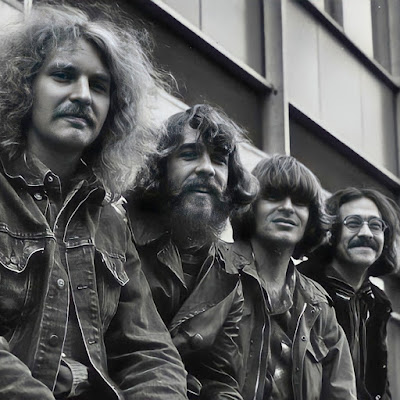 |
| Creedence Clearwater Revival 1969 |
According to Fogerty, his lyrics told of "the apocalypse that was going to be visited upon us. It wasn't until the band was learning the song that I realized the dichotomy. Here you got this song with all these hurricanes and blowing and raging ruin, but...It's a happy-sounding tune, right?"
Green River (1969)
"Green River" was released as a single with the B-side of "Lodi," Cash Box ranked it as the Number 19 single of 1969. The third and final CCR track on the Rock & Roll Hall of Fame's 500 Songs that Shaped Rock & Roll list, "Green River," peaked at Number 2 for one week, behind "Sugar, Sugar" by The Archies;.
The song was based on a childhood vacation spot of John Fogerty's. To Rolling Stone in 2012, Fogerty stated: "All those little anecdotes are part of my childhood, those are things that happened to me actually." As to the music, Fogerty said: "'Green River' is obviously a tip of the hat to the Sun Records sound."
Album: Creedence Clearwater Revival
Released: November 2, 1969
Genre: Rock & roll, rockabilly, blues
Producer: John Fogerty
Producer: John Fogerty
The last of three albums CCR released in 1969, Willy & the Poor Boys, was planned as a concept LP. The lead single, "Down on the Corner," introduced Creedence as an old-time jug band, Willy and the Poor Boys.
After the idea was dropped, the band was still photographed in character for the cover art. Rolling Stone's 2020 choices for the 500 Greatest Albums of All Time list Willy & the Poor Boys, Number 193.
...one of the greatest pure rock & roll albums ever cut.
In a contemporary review for The Village Voice, Robert Christgau believed it the group's best record. He wrote, "Fogerty's subtlety as a political songwriter (have you ever really dug the words of 'Fortunate Son'?) comes as no surprise."
Fortunate Son (1969)
"Fortunate Son" was released as the B-side to the lead single "Down On the Corner." It reached Number 14 on the US charts the week before Billboard changed its methodology, counting double-sided hits together. The tracks combined with climbing to Number 9 the following week to peaking at Number 3.
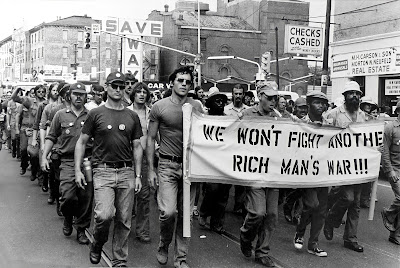 |
| Vietnam War protest |
It became an anti-war anthem and a symbol of the counterculture's opposition to US military involvement in the Vietnam War. In 2013, the Library of Congress added the song to the National Recording Registry for being "culturally, historically, or aesthetically significant."
Album: Creedence Clearwater Revival
Released: July 16, 1970
Genre: Blues, rockabilly, space rock
Producer: John Fogerty
Cosmo's Factory offered the musical ingredients for their "swamp rock" sound. "I Heard It Through the Grapevine" was a soul; "Lookin' Out My Back Door," rockabilly and classic rock & roll on display with "Travelin' Band."
In its original review, Rolling Stone opined: "It should be obvious by now that Creedence Clearwater Revival is one great rock and roll band. Cosmo's Factory, the group's fifth album, is another good reason why."
Travelin' Band (1970)
"Travelin Band," released as the A-side of "Who'll Stop the Rain," peaked at Number 2 behind "Bridge Over Troubled Water" by Simon & Garfunkel. John Fogerty wrote "Travelin' Band," a tribute to Little Richard's music.
 |
| Little Richard |
Specialty Records, which owned Richard's catalog, was not amused. They sued the band and reached a settlement. With some sense of irony, the lawsuit charged "Good Golly Miss Molly" was copied, but Creedence bass player Stu Cook said it sounded more like "Long Tall Sally."
Lookin' Out My Back Door (1970)
"Lookin' Out My Back Door" was musically a tribute to the Bakersfield Sound. Buck Owens, one of the genre's architects, is mentioned in the lyrics. It was CCR's final Number 2 Billboard hit, held off by Diana Ross's version of "Ain't No Mountain High Enough."
The colorful, dream-like imagery in the lyrics led some to believe it was about drugs. However, Fogerty says it was written for his then-three-year-old son, Josh. Dr. Seuss's book And to Think That I Saw It on Mulberry Street inspired the parade passing by.

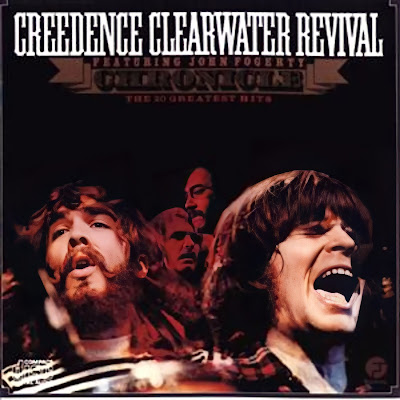
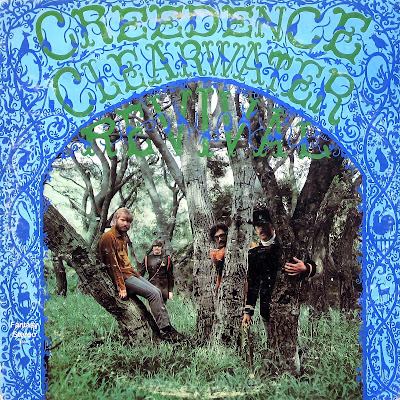




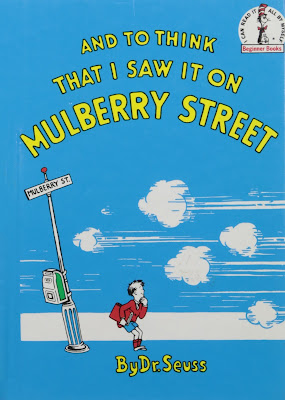



Comments
Post a Comment